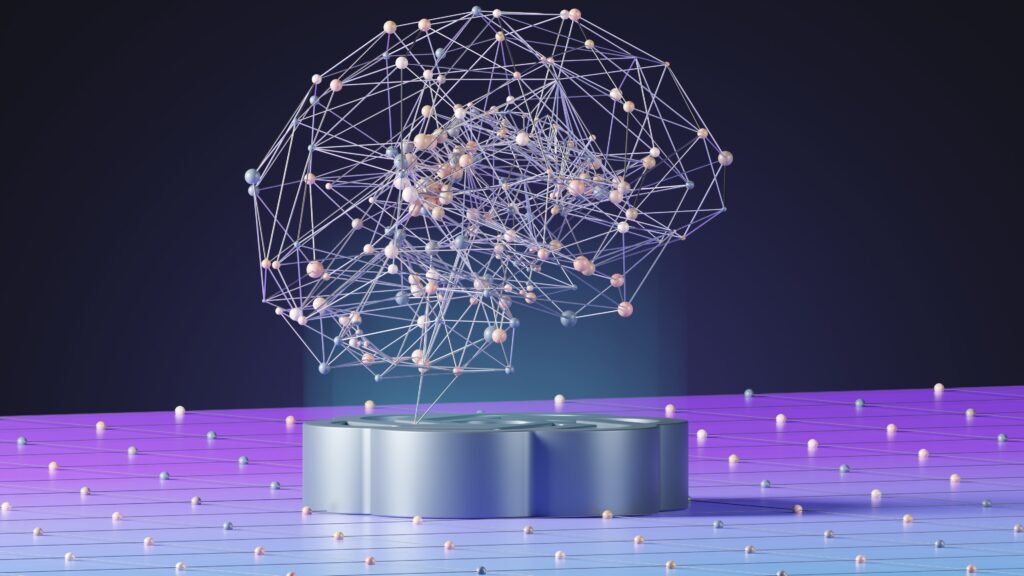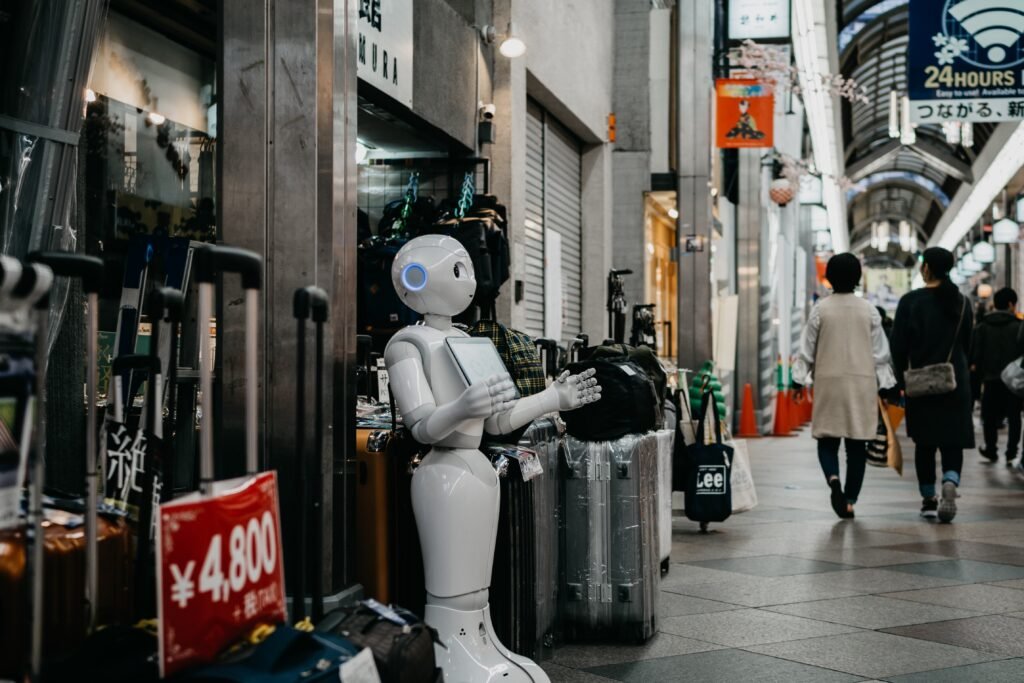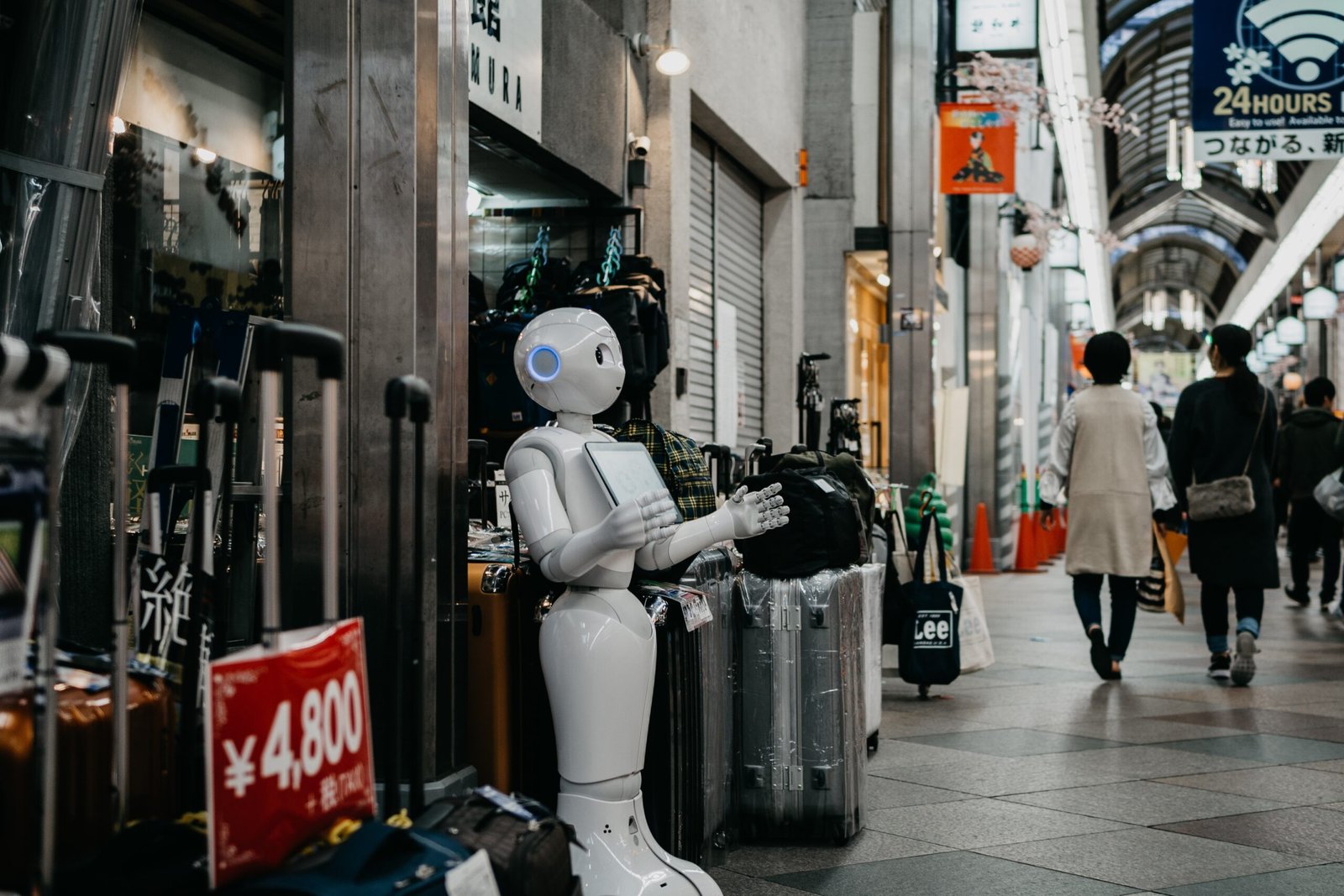Artificial Intelligence, commonly referred to as AI, has become a buzzword that often leaves people curious about its true meaning. In an attempt to demystify this complex concept, we explore the definition of artificial intelligence. AI encompasses the theory and development of computer systems that possess the ability to perform tasks that would typically require human intelligence. From machine learning to problem-solving, AI has undoubtedly revolutionized various industries, paving the way for a future where machines can replicate human thought processes. Whether you are a novice or a tech enthusiast, understanding the definition of artificial intelligence is a crucial stepping stone to unravel the innovative potential that it holds.

What is Artificial Intelligence?
Defining Artificial Intelligence
Artificial Intelligence (AI) refers to the field of computer science that focuses on creating intelligent machines capable of performing tasks that typically require human intelligence. AI systems are designed to imitate human cognition, including reasoning, problem-solving, learning, and decision-making. The goal of AI is to develop machines that can understand, analyze, and process information like humans, enabling them to perform specific tasks or solve complex problems efficiently.
The AI Field of Study
The study of AI encompasses various subfields, including machine learning, natural language processing, computer vision, robotics, and expert systems. Machine learning is a fundamental aspect of AI that involves algorithms that allow machines to learn from data and improve their performance over time. Natural language processing focuses on enabling machines to understand and communicate in human language, while computer vision aims to provide machines with the ability to perceive and interpret visual information. Robotics involves the design and development of physical machines capable of interacting with the environment, and expert systems simulate human expertise in specific domains.
AI in Popular Culture
Artificial Intelligence has captured the imagination of popular culture, appearing in numerous books, movies, and television shows. From the iconic portrayal of AI in “HAL 9000” from “2001: A Space Odyssey” to the intelligent operating system, “Samantha,” in the movie “Her,” AI has become a prominent subject in storytelling. These fictional representations often explore the ethical implications and potential impact of AI on society, ranging from the fears of AI taking over humanity to the benefits it can bring in improving various aspects of our lives. The influence of AI in popular culture highlights its growing significance and public fascination with this field of study.
Types of Artificial Intelligence
Narrow AI
Narrow AI, also known as weak AI, refers to AI systems designed to perform specific tasks within a limited domain. These systems are designed to excel in one particular area and are not capable of exhibiting general intelligence. Examples of narrow AI include voice assistants like Siri and Alexa, which are excellent at understanding and responding to specific voice commands but lack the ability to perform tasks outside their domain. Narrow AI has achieved significant advancements and is widely used in various applications, from chatbots in customer service to autonomous vehicles.
General AI
General AI, also known as strong AI or human-level AI, refers to machines with the ability to understand, learn, and apply knowledge across multiple domains, similar to human intelligence. This level of AI would possess the capacity to perform any intellectual task that a human being can do. However, achieving general AI remains a significant challenge due to the complexity of human-like cognition and reasoning abilities. While there has been progress in specific AI capabilities, such as natural language processing and image recognition, the development of true general AI remains an ongoing pursuit in the field.
Superintelligent AI
Superintelligent AI refers to AI systems that surpass human intelligence in virtually every aspect, including creativity, problem-solving, and strategic thinking. These systems would outperform humans in any intellectually demanding task and potentially possess capabilities beyond human comprehension. The concept of superintelligent AI raises ethical concerns and speculation about whether humans would be able to control or understand such advanced machines. The development of superintelligent AI is considered a long-term goal and has sparked debates on the potential risks and benefits it may bring.
AI vs. Human Intelligence
Capabilities of AI
Artificial Intelligence has exhibited remarkable capabilities, showcasing its potential to outperform humans in certain tasks. AI systems can process and analyze large amounts of data rapidly, enabling insights and predictions that would be difficult or time-consuming for humans to achieve. Additionally, AI algorithms can detect patterns and extract meaningful information from complex datasets with high accuracy. This capability has proven beneficial in various fields, including healthcare, finance, and scientific research. AI-powered technologies, such as autonomous vehicles and virtual assistants, also demonstrate the ability of machines to perform complex actions and interact with their environment.
Limitations of AI
While AI has made significant advancements, it still has limitations compared to human intelligence. AI systems often struggle with tasks that humans find intuitive, such as understanding context, sarcasm, or emotions. Current AI models also heavily rely on large amounts of labeled data for training, making them less adaptable to new or unfamiliar scenarios. AI systems lack common sense reasoning and the ability to understand abstract concepts without explicit training. Furthermore, AI systems are prone to bias and may replicate or amplify existing prejudices present in the training data. These limitations highlight the need for continued research and development in the field to address these challenges and improve AI capabilities.
Comparing AI and Human Intelligence
AI and human intelligence possess distinct characteristics, each with its strengths and weaknesses. While AI excels in computational tasks, data processing, and pattern recognition, human intelligence possesses unique qualities such as creativity, intuition, and emotional intelligence. Human intelligence is adaptive and can apply knowledge across various domains, leveraging previous experiences to solve new problems. On the other hand, AI systems can process vast amounts of data quickly, perform repetitive tasks without fatigue, and provide objective and consistent analysis. Both forms of intelligence have their place in different contexts, and the future lies in harnessing the strengths of both AI and human intelligence for mutual benefit.
History and Evolution of Artificial Intelligence
The Origins
The concept of artificial intelligence dates back to ancient times, where myths and folklore often depicted machines imbued with human-like qualities. However, the formal study of AI began in the mid-20th century when computer scientists and researchers attempted to create intelligent machines. The development of electronic computers in the 1940s and 1950s provided the foundation for exploring the possibilities of machine intelligence.
Dartmouth Conference
In 1956, the Dartmouth Conference marked a significant milestone in the field of AI. Led by John McCarthy, Marvin Minsky, Nathaniel Rochester, and Claude Shannon, the conference brought together researchers interested in developing AI and laid the groundwork for AI as a distinct research discipline. The participants at Dartmouth College discussed the potential of creating machines that could mimic human intelligence and proposed the use of algorithms and logic for achieving AI capabilities.
AI Winter
The field of AI experienced a period known as the “AI Winter” during the late 1960s and 1970s. Progress in AI research did not meet the high expectations set in the early years, leading to skepticism and decreased funding. The lack of practical applications and the inability to solve complex problems challenged the feasibility of AI. However, AI research regained momentum in the 1980s, thanks to breakthroughs in machine learning and the introduction of expert systems.
Recent Advancements
In recent decades, AI has seen significant advancements due to improvements in computing power, the availability of large datasets, and breakthroughs in algorithms. Machine learning techniques, such as deep learning and neural networks, revolutionized the field, enabling AI systems to learn from data and make accurate predictions. The emergence of big data and the integration of AI in various industries, such as healthcare, finance, and transportation, have accelerated the development and adoption of AI technologies. Today, AI continues to evolve rapidly, with ongoing research aimed at enhancing its capabilities and addressing ethical concerns associated with its applications.

Applications of Artificial Intelligence
Automation and Robotics
One of the primary applications of AI is in automation and robotics. AI-powered robots and automated systems are increasingly being used in industries such as manufacturing, logistics, and healthcare. These robots can perform repetitive tasks with precision, efficiency, and speed, reducing the need for human labor in monotonous and physically demanding jobs. From assembly lines in factories to automated warehouses, AI-enabled automation technology is transforming various industries, improving productivity and operational efficiency.
Natural Language Processing
Natural Language Processing (NLP) focuses on enabling machines to understand and process human language. NLP plays a vital role in applications such as virtual assistants, chatbots, and language translation. AI-powered virtual assistants like Siri, Alexa, and Google Assistant can understand and respond to voice commands, providing users with personalized information and performing tasks such as setting reminders, playing music, or booking appointments. NLP is also used in sentiment analysis, where AI algorithms analyze text data to determine the sentiment or emotion expressed in online reviews, social media posts, and customer feedback.
Computer Vision
Computer Vision involves giving machines the ability to perceive and interpret visual information, simulating human vision. AI-powered computer vision systems can analyze images or video streams, extract meaningful information, and make decisions based on visual inputs. This technology finds applications in various fields, including autonomous vehicles, surveillance systems, and medical imaging. For example, computer vision algorithms can enable self-driving cars to recognize and interpret road signs, identify objects, and navigate safely on the road.
Expert Systems
Expert Systems are AI-driven programs that simulate human expertise in specific domains. These systems leverage knowledge and reasoning to solve complex problems and provide intelligent recommendations. Expert systems typically consist of a knowledge base, an inference engine, and a user interface. They find applications in diverse fields, including medicine, finance, and engineering. For instance, in healthcare, expert systems can assist doctors in diagnosing diseases by analyzing patient symptoms and medical records, providing accurate suggestions for treatment.
Personal Assistants
AI-powered personal assistants have become increasingly popular, with virtual assistants such as Siri, Alexa, and Google Assistant transforming the way people interact with technology. These personal assistants understand natural language commands, perform tasks, answer questions, and provide personalized recommendations. AI-powered personal assistants leverage machine learning techniques to improve their performance over time, adapting to individual preferences and providing more accurate responses. From setting reminders and sending messages to playing music or providing weather updates, personal assistants offer convenience and enhance the overall user experience.
Ethical Considerations in AI
Job Displacement
As AI technology continues to advance, there are concerns about job displacement and its impact on the workforce. Automation powered by AI has the potential to replace human workers in certain industries and occupations. Jobs that involve repetitive tasks or can be automated through AI algorithms are at risk of being eliminated or significantly reduced. However, it is important to note that AI also brings new job opportunities, creating a demand for skill sets focusing on the development, maintenance, and oversight of AI systems. Consequently, it becomes crucial to provide adequate training and support for individuals affected by job displacement and to ensure a smooth transition into the changing job market.
Bias and Discrimination
AI systems are trained on large datasets that may contain inherent biases. These biases can manifest in AI algorithms, leading to discriminatory outcomes and reinforcing existing societal biases. For example, facial recognition systems have shown biases in accurately identifying individuals with darker skin tones or women, resulting in unequal treatment in areas such as law enforcement or hiring processes. Addressing bias and discrimination in AI requires conscious efforts to ensure diverse and representative training datasets, as well as ongoing monitoring and auditing of AI systems to mitigate unintended biases in decision-making.
Privacy and Security
The increasing reliance on AI and the collection of vast amounts of personal data raise concerns about privacy and security. AI systems often require access to sensitive information to perform their tasks effectively. However, protecting personal privacy and ensuring data security become critical considerations. Striking the right balance between extracting value from data and preserving individual privacy rights requires robust data protection measures, such as strong encryption, secure data storage, and transparent data handling practices. Regulations and ethical guidelines play a vital role in safeguarding data privacy and ensuring responsible AI development and deployment.
Ethical Decision-Making
AI systems operate based on algorithms and models designed by humans, and ethical considerations play a crucial role in their development and use. Programming AI systems to make ethical decisions is a complex task that involves addressing moral dilemmas, avoiding harm to individuals or society, and ensuring fairness and transparency in decision-making processes. The development of ethical frameworks and guidelines for AI systems aims to promote responsible behavior and address potential ethical challenges, fostering trust and accountability in the use of AI technology.

AI in Business
Improving Efficiency
AI technology offers significant opportunities for businesses to improve efficiency and streamline operations. Through automation and intelligent algorithms, AI can automate repetitive tasks, reduce errors, and optimize resource allocation. AI-powered systems can analyze vast amounts of data rapidly, providing valuable insights and enabling data-driven decision making. This increased efficiency allows organizations to optimize their processes, reduce costs, and enhance overall productivity.
Enhancing Customer Experience
AI has transformed the way businesses interact with customers, enabling enhanced customer experiences across various touchpoints. Chatbots and virtual assistants provide personalized and instant customer support, improving response times and enhancing customer satisfaction. AI algorithms can also analyze customer data to understand preferences, anticipate needs, and deliver personalized recommendations. By leveraging AI, businesses can create tailored marketing campaigns, improve customer engagement, and build stronger customer relationships.
Data Analysis and Predictive Analytics
The ability of AI to process and analyze vast amounts of data makes it a valuable tool for data analysis and predictive analytics. By employing machine learning algorithms, businesses can extract insights from complex datasets, uncover patterns, and make predictions about customer behavior, market trends, and business outcomes. This enables organizations to make data-driven decisions and develop strategies based on accurate forecasts, improving competitiveness and supporting business growth.
Automation of Repetitive Tasks
AI technologies are particularly adept at automating repetitive tasks that previously required human intervention. From data entry and invoice processing to inventory management and quality control, AI can handle routine tasks efficiently, reducing the need for manual labor and freeing up employees to focus on more strategic and creative elements of their work. The automation of repetitive tasks not only enhances productivity but also reduces errors and increases operational efficiency.
Decision Support Systems
AI-powered decision support systems assist organizations in complex decision-making processes. By analyzing vast amounts of data and applying sophisticated algorithms, these systems provide organizations with valuable insights, predictions, and recommendations. Decision support systems can help with strategic planning, risk assessment, and scenario analysis, enabling organizations to make informed decisions that align with their objectives. AI-powered decision support systems enhance decision-making processes, enable more accurate forecasts, and help organizations navigate complex business environments.
The Future of Artificial Intelligence
Advancements in AI Research
The future of AI holds exciting possibilities with continued advancements in AI research. Ongoing research aims to improve AI capabilities, addressing limitations such as common sense reasoning, adaptability to new situations, and robustness in decision-making. AI algorithms that can learn from fewer examples, perform self-supervised learning, and generalize knowledge across domains are being explored. Additionally, AI advancements are expected to enable the development of more explainable and interpretable models, fostering trust and transparency in AI applications.
AI in Healthcare
AI has significant potential to transform healthcare by enhancing diagnosis, treatment, and patient care. Machine learning algorithms can assist in medical image analysis, helping detect early signs of diseases and improving accuracy in diagnosis. AI-powered systems can also analyze patient data, clinical records, and scientific literature, assisting in personalized treatment recommendations and drug discovery. AI-enabled chatbots and virtual nurses can provide patient support, answer medical queries, and offer guidance for self-care. As AI continues to advance, it is poised to revolutionize healthcare by increasing efficiency, improving outcomes, and reducing healthcare disparities.
AI in Transportation
AI is reshaping the transportation industry, especially with the development of autonomous vehicles. Self-driving cars powered by AI algorithms have the potential to enhance road safety, increase mobility for those unable to drive, and reduce traffic congestion. AI-driven systems for traffic management can optimize routes, predict traffic patterns, and improve overall transportation efficiency. Additionally, AI-powered logistics and supply chain management systems can optimize delivery routes, reduce shipping costs, and enhance supply chain resilience. The future of transportation will see increased integration of AI to create smarter, safer, and more efficient systems.
AI in Education
AI applications in education are poised to transform the learning experience and improve educational outcomes. Adaptive learning platforms powered by AI algorithms personalize instruction according to the needs and learning styles of individual students, offering tailored content and feedback. AI can also facilitate automatic grading, saving time for educators and providing timely feedback to students. Virtual tutors, chatbots, and intelligent tutoring systems can assist students in their learning journey, providing support, answering questions, and offering additional resources. AI in education holds promise for enhancing student engagement, improving academic performance, and facilitating lifelong learning.
AI and the Job Market
The integration of AI in the job market is a topic of ongoing debate and speculation. While AI has the potential to automate certain tasks and displace jobs, it also creates new opportunities and empowers workers. Many jobs will undergo transformation as AI takes on repetitive and routine tasks, allowing humans to focus on areas that require creativity, critical thinking, and emotional intelligence. As the job market evolves, the acquisition of new skills and continuous learning will become increasingly important. Collaborative frameworks between AI and humans are likely to develop, where humans and AI systems work together, leveraging their respective strengths to achieve optimal results.
Controversies Surrounding Artificial Intelligence
Existential Risk
One of the major concerns surrounding the development of AI is the potential for existential risk. As AI systems become increasingly intelligent and self-improving, there are fears of them surpassing human control or developing goals that are misaligned with human values. The concept of superintelligent AI has sparked debates on whether humans would be able to control or understand such advanced machines. Ensuring the ethical development and responsible use of AI is crucial to mitigate existential risks and ensure the overall well-being and safety of humanity.
Autonomous Weapons
The development of AI-powered autonomous weapons is another area of controversy. Concerns have been raised about the implications of AI systems making life-or-death decisions on the battlefield without human intervention. The ethical considerations surrounding autonomous weapons revolve around accountability, adherence to international laws and norms, and the potential for unintended consequences. Striking a balance between national security needs and ethical guidelines is essential to prevent the misuse of AI in warfare and maintain human oversight in critical decisions.
AI and Job Displacement
The potential impact of AI on job displacement has generated substantial debate. While AI has the capacity to automate certain tasks and replace human workers, it also creates new job opportunities in AI development, maintenance, and oversight. The true impact of AI on the job market remains uncertain, as it is influenced by various factors such as technology adoption rates and the ability of the workforce to adapt to changing skill requirements. Ensuring adequate reskilling and upskilling opportunities will be crucial in mitigating the potential negative consequences of job displacement.
Ethical Responsibility
The ethical responsibility associated with AI development and deployment is a subject of increasing concern. Ensuring that AI systems are designed and used in a manner that upholds ethical principles is crucial. Developers and organizations using AI have a responsibility to address potential biases, promote fairness and transparency, and avoid harm to individuals or society. Regulatory frameworks and guidelines play a significant role in fostering ethical practices and holding organizations accountable for the ethical implications of their AI systems.
AI Bias and Fairness
AI systems trained on biased or unrepresentative data can perpetuate and amplify existing societal biases and discrimination. Biases in AI algorithms can lead to unjust outcomes in areas such as hiring practices, criminal justice, and access to resources. Addressing algorithmic bias requires diverse and representative training datasets, continuous monitoring, and auditing of AI systems, and the development of fairness metrics and evaluation frameworks. Ensuring fairness in AI is essential for building trust and creating AI systems that benefit all individuals and communities equitably.
Conclusion
Artificial Intelligence has come a long way since its inception, and its impact on various aspects of our lives continues to grow. From narrow AI applications to the pursuit of general and superintelligent AI, the field of AI holds immense potential for transforming industries, enhancing efficiency, and solving complex problems. However, ethical considerations surrounding AI, such as job displacement, bias, privacy, and responsible decision-making, must be addressed to ensure its responsible development and deployment. The future of AI promises exciting possibilities, and as the field continues to evolve, striking a balance between harnessing the benefits of AI while addressing potential risks will be crucial for a sustainable and beneficial integration of AI into our society.






